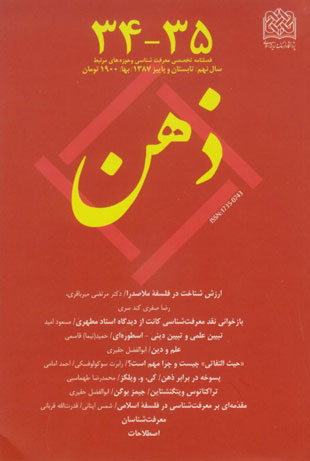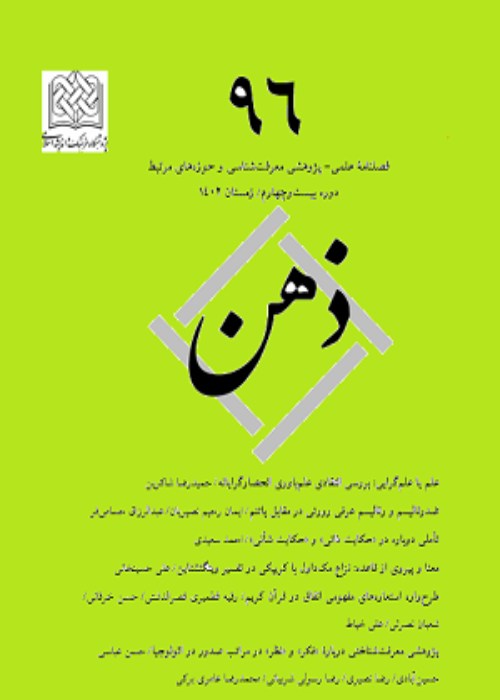فهرست مطالب

فصلنامه ذهن
سال نهم شماره 2 (پیاپی 35، تابستان و پاییز 1387)
- 204 صفحه، بهای روی جلد: 19,000ريال
- تاریخ انتشار: 1387/08/14
- تعداد عناوین: 10
-
صفحه 5
-
صفحه 55
-
صفحه 81
-
صفحه 111
-
صفحه 175
-
صفحه 179
-
Page 5To explain knowledge representativeness, at first, notions such as knowledge, representativeness and then levels and kinds of knowledge will be explained and then it will be determined that whether knowledge is material or immaterial. Thus, we have to find what Mulla Sadra means by knowledge. Our studies show that he considers concept, instead of quiddity, for knowledge. Also he regards knowledge as existence, and thinks that like existence it is self-evident; though to make some notice, he provides some arguments for knowledge. Mulla Sadra thinks that, like existence, knowledge is gradated, and considers for it kinds such as sense, imaginal, and rational knowledge. He believes that knowledge is an immaterial existence in its all grades and kinds. For him, relation between knowledge and knower is an emanative one; thus, he rejects immanent relation of the soul with all perceived things; and considers the relation between the soul and the known as the relation between agent and act. For Mulla Sadra, representativeness of various levels of knowledge is as follows: he thinks that the mere relation between rational perception and Active Intellect, which is the unity of the real (Active Intellect) and the lower (Rational Perception) suffices to make a distinction between the lower and the real. This representativeness is established between imaginal and sense perception and Active Intellect and soul as well. The important point concerns representativeness of sense perception of the accidental (sensory form in the world of nature). He believes that sensory form is a lower level of the Ideal form of the Active Intellect, since sense perception by the soul is lower than the Active Intellect and the soul. Representativeness between sense perception and the accidental is justified through the Active Intellect.Keywords: Knowledge, representativeness, essence of knowledge, existence of knowledge, levels of knowledge, sense perception, imaginal perception, rational perception, Active Intellect, immanent existence, emanative existence
-
Page 21Kant's categories and philosophical secondary intelligiblles or concepts in Islamic philosophy are one of the challenging points and philosophical criticism between contemporary Islamic philosophy and Kant's philosophy. This article tries to answer three questions:1. What is Motahharie's view on Kant's innatism?2. Is Kant really an innatist?3. What is Kant's innatism?The answers of these questions are:1. According to Motahharie Kant is an innatist and his theory is maximalinnatism.2. Kant is an innatist in his opinion and this is his commentator's belief.3. Kant's theory is basically minimal innatism.Keywords: Kant's innatism, Motahharie's view, Kant's view
-
Page 35This is a critique on scientism according to Ernst Cassirer’s philosophy of symbolic forms. What is emphasized here is the perspectivism in the thought of this Neo-Kantian philosopher which can be interpreted so that mythicalreligious explanations receive an epistemological value of its own independent from scientific one. Thus, without reducing the epistemological truth of scientific propositions, we propose to find out what is not seen in the scientific explanation as a rule. Being one of the most important concepts of the science, “causality” would be compared with what Cassirer calls “mythical causality”. The most fundamental distinction between mythical and scientific concepts of causality leads us to this conclusion that the former responses essentially to a spiritual need, that is, holding for humankind a pivotal role in the events occurring all over the cosmos.Keywords: explanation, scientific causality, mythical causality, free will, the accident
-
Page 55In the present article, the author tries to show that, while both seeking for truth; science and religion have various approaches, tools, and goals. In a very brief discussion of various definitions posed for science and religion and with a passing look at the history of science, the author tries to prove his claim.Keywords: science, religion, interaction between science, religion, law
-
Page 69The author offering a general sense of intentionality asks about its importance and answering this question refers to egocentric or the Cartesian predicament with which the philosophy was involved in the previous centuries. In the Cartesian, and Lockean tradition, When we are conscious, we are primarily aware of ourselves or our own ideas. In these traditions Consciousness is taken to be like a bubble or an enclosed cabinet and our awareness is directed toward impressions and concepts in this enclosed space, not directly toward the things "outside. "Our consciousness, first and foremost, is not "of "anything at all. Rather, we are caught in what has been called an "egocentric predicament. " The author then referring to Samuel Beckett's novel Murphy tries to explain the egocentric predicament more explicitly and says that we know instinctively that we are not trapped in our own subjectivity and emphasis that one of phenomenology's greatest contributions to have broken out of the egocentric predicament, to have checkmated the Cartesian doctrine. Phenomenology shows that the mind is a public thing, that it acts and manifests itself out in the open, not just inside its own confines. Everything is outside. Things can exist in different ways. The way things appear is part of the being of things; things appear as they are, and they are as they appear. Things do not just exist; they also manifest themselves as what they are.Keywords: Intentionality, phenomenology, phenomen, egocentric predicament, The Cartesian predicament
-
Page 81The Aristotelian Psuche is different from the Mind. From the beginning of the new era, the Aristotelian Psuche has been replaced by the concept of mind. But the concepts of mind and consciousness are incomplete, and they cannot indicate the total reality of human being. Conversely, Psuche is a broad notion by which we can grasp the true idea about the reality of human being. In this article, based on the Aristotelian vision on Psuche, Wilkes has tried to show the fundamental difference between these two notions. Also he argues for Psuche and against mind. He suggests to remove the concept of mind and to use the Aristotelian Psuche. Philosophically, it is more precise than the other concept. In fact, concerning the scientific psychology, the concept of the Psuche is more suitable than the mind.Keywords: Psuche, Mind, Consciousness, Psychology, Functionalism
-
Page 111In the present article, the author discusses Tractatus, well-known and difficult-to-understand book from various angles. To do so, he introduces ideas of various philosophers and logicians concerning the subject matter of Tractatus.Keywords: Wittgenstein, Tractatus, Proposition, Elementary proposition, Truth, Falsehood
-
Page 163This paper is from Routledge Encyclopedia of Philosophy in which writer especially discusses on some important virtues of Islamic Epistemology. She first cites to Muslim philosophers about the possibility of knowledge then defines it to perception of immaterial form or universals. She indicates that paying attention to the subject of knowledge between Muslim philosophers is in the light of their interest to acquire man's Happiness. They in their epistemological discussions notice to the properties of Idea and Judgment, Argument and Illumination, some virtues like subject and predicate, universality and individuality, accidental and essential, and also they concentrate on the role of Mind or Reason meanwhile it can be said believing to prophecy knowledge is one of prominent virtue of Islamic Philosophy. Writer in this paper notes to the views of Ibn Sina, Ibn Bajja, Ibn Rushdm Farabi and Ibn Tufail, and did not consider another Muslim philosophers like Mulla sadra And Suhravardi's viewpoints.Keywords: Ideas, Judgments, Universals, Reason, Mind, Argument, Illumination, Prophecy knowledge


